Behind The Words: The Painful Process Of Translating One Of Japan's Most Verbose Games

Last month, I discovered The Legend of Heroes series, a long-running JRPG franchise that I only just picked up on with its latest PSP release, Trails in the Sky. These games are notorious for a focus on narrative as evidenced by absurdly long, text-heavy scripts. Curious about the process behind translating such a huge project, I asked Xseed and was put in touch with Jessica Chavez, the publisher's senior editor. In this interview, the charming Chavez shares the horror and struggle of such an overwhelming project, reveals the staggering total number of hours she spent working on it, and breaks down at the prospect of translating the sequel.
Approximately how long is the script for Legend of Heroes: Trails in the Sky? How many words?
I’ve spent the last month trying to forget this bit of info…
Well, according to some erratically scrawled notes carved into my desk, Trails in the Sky clocked in at somewhere around 1.5 million characters (“characters” being Japanese kanji). That’s roughly equivalent to 3 hefty RPGs or a 600-800 page novel in English.
How long did this project take from start to finish? About how many hours do you estimate that you worked on Trails?
The Legend of Heroes: Trails in the Sky is by far the longest we’ve ever spent localizing a game. From start to finish it straddled three separate years from November 2009 to February 2011 and was a real marathon run for everyone involved. But while translation started in November 2009, my role as editor didn’t really begin in earnest until March 2010, because I was still preoccupied with Lunar: Silver Star Harmony at that point. After Lunar was in the clear, I was able to focus my horrified attention on Trails for the next three months. During that initial period I slogged through system text and the prologue and realized belatedly just how impossible it would be to meet the deadline at the current pace. So, from June to December of 2010, I deprived the L.A. Transit Authority of my company and worked from home to squeeze out some extra hours.
Here’s a simplified breakdown of those “extra” hours:
First three months (cool blue) + Crunch Time (danger red) =
(~8 hours/day X 5 days/week X 3 months) +
(~12 hrs/day X 6 days/week X 6 months) = ~2208 hours
2208 hours = 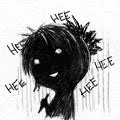
How many other people were you working with on the translation for Trails?
Trails in the Sky required the usual ritual sacrifice of company personnel with the addition of a chubby house cat, plus a few extra warm bodies. The main team consisted of four people: one in-house editor and three translating guns for hire. John Sears (our initial Sora no Kiseki expert) served as the vanguard of the operation and tackled the system text, the prologue, chapter 1, and a bit of chapter 2. He was relieved in June 2010 by Jeff Nussbaum, who worked in tandem with Chris Cruz to defeat the remaining million or so characters (Japanese kanji), and while these gentlemen were merrily burning out their corneas, I served as the lead editor (with help from our other in-house editor, Tom, during chapter 4). Being lead editor generally entails a lot of rewriting, formatting, bleeding eyes and cursing. I did this for the latter nine months of the game’s localization process. And finally, though contributing nothing of value to the project, the aforementioned cat served as a kind of gelatinous moral support.
Trails in the Sky turned out to be too mighty to be defeated by a skeleton team in the end, however, and QA [quality assurance] was only managed by roping Tom in once again as well as stealing a guy from marketing (sorry, Ken!). I should also mention my long-suffering manager, Kenji, who had to facilitate all communication between us and the dev team in Japan as well as juggle the master submission and other delightful bureaucratic processes.
Where do you start on a project this massive? How do you go about scheduling something like this and making it happen?
Xseed didn’t really have a blueprint for scheduling such...titanic games until Trails in the Sky came along. Normally we look at an old schedule for a similarly-sized game and extrapolate from there. Translating and editing the text is, of course, the main chunk of space allotted in a timetable, but you also have to budget for QA (bug checking), master submission, ESRB, nervous breakdowns, etc, etc. With Trails in the Sky it was almost comical how little our other games compared to it. In the end we only had one marker to hit: Make the end of the fiscal deadline (March 2011) or die trying.
What are some of the challenges of a huge translation project like this?
Hmm.... Well, probably the biggest challenge for any game this size boils down to stamina. Can you last through six-plus months of grinding yourself stupid? The gaming crunch, a legendary time period of exquisite pain and emotional immolation in our industry, usually only lasts a couple of weeks. Unfortunately for us, Trails required six straight months of it in order to make deadline, and following that we had to dive right into QA and ESRB. It was the kind of experience that makes you forget what sunlight feels like. In the end I was mentally pretty toasty and the only way I felt I could shed some of the stress was to physically remove about a pound of hair from my head. Six months of hard crunch is worth about 18 inches of hair by my estimates then.
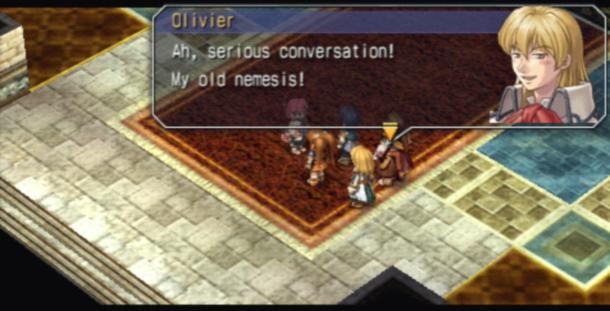
One of the things that I liked about Trails in the Sky was the light-hearted tone of a lot of the dialogue and the sense of humor in the writing. Is this present in the original Japanese script? Did you focus in on it or emphasize it in your translation?
A victory for localization! We try extra hard to make sure that people get their laughs in where the text allows, so it’s great to hear such positive impressions. I can’t speak for other editors, but when I read on forums or in reviews that certain cherished lines were appreciated or noticed it really makes my day.
Luckily for us, Trails in the Sky was originally plotted in a generally cheery/carefree tone that was very conducive to humor, especially our brand of humor. It was easy to pinpoint nodes of comedy within the text, buff them to a pearly shine, and then glue disco balls where appropriate. Some specific characters from Trails also got special treatment. Estelle was a personal favorite of mine and very easy to write for, and I’m sure anyone who has played through at least chapter 1 has bathed in the warm glow that is Olivier. Most of his elegantly absurd dialogue was courtesy of Chris, who rendered him pitch-perfect from Japanese to English.
So overall the original Japanese script was light and fun and afforded us many opportunities to emphasize the shiny bits within our own translation.
Are there any elements of the Japanese script that specifically didn’t make it over to this version of the game (presumably due to not translating well) for whatever reason?
Mmmmm.... We didn’t have too many problems localizing the script from what I recall. Trails in the Sky wasn’t so strongly 'Japanese' that it required a lot of rewrites to make it understandable to the average player. The only clear change that I remember offhand was adjusting a conversation during the Jenis Royal Academy section of the game when some of the main characters decided that they could drop the formalities and simply refer to each other by their first names. In the Japanese text this called for the discontinued use of "-san" which roughly translates to "Mr." or "Mrs./Ms." Since having young characters use Mr. or Mrs./Ms. with one another comes off as extremely awkward in English, we usually just don’t include that prefix in our translation. Instead we adjust their manner of speaking to one another ( i.e. we’d write more formal speech to express the politeness of a certain character, etc). Not having used any overt formality previously between the characters rendered this conversation of dropping the "san" kind of pointless, so we had to do a bit of rewriting there.

Another surprisingly charming element in Trails was how every single treasure chest offered up its own unique quip if you checked it a second time after you’d already opened it. [Examples pictured in screenshot above and few more below.] Was this part of the Japanese version of the game?
Ah-HA! You’ve just made it all worthwhile by saying that! Those chest messages were a labor of love and a gleeful, dirty secret while I was working on Trails. They were not, in fact, part of the Japanese script, but a spontaneous inspiration born of caffeine overdose and lack of sleep.
The idea percolated in my brain after about a week of slogging through the system text for the game where I kept seeing a reoccurring line:
宝箱には何も入っていない。 The chest is empty.
This innocent-sounding line gave me pause because normally, games that have objects which all share a common line of text tend to pull that key system message from a single file. Trails, as it turned out, had a unique cell of text for EVERY chest in the game. This unusual (but marvelous!) textual circumstance allowed me to custom tailor every treasure chest message in the game. I did this for two reasons.
1) I had previously discussed with marketing about hiding a password somewhere in the game to compliment our website launch as a code to enter for a secret page. Non-essential treasure chest "empty" messages seemed to be an ideal place to drop a secret password without meddling unnecessarily with story text.
And…
2) Because it was fun. I mean, what gamer hasn’t looked at a pilfered chest in-game and wished something else would be in there? I‘ve also always thought that chests were secretly annoyed at being plundered by random strangers and wouldn’t it be funny if they said so.
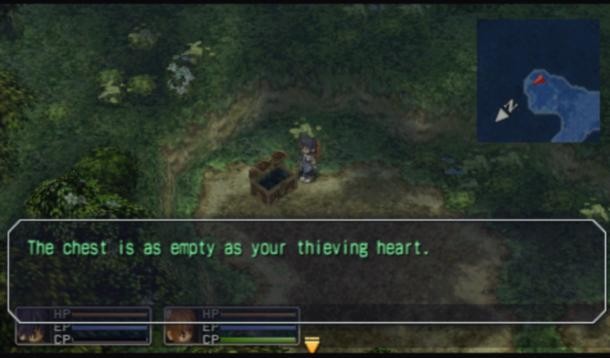
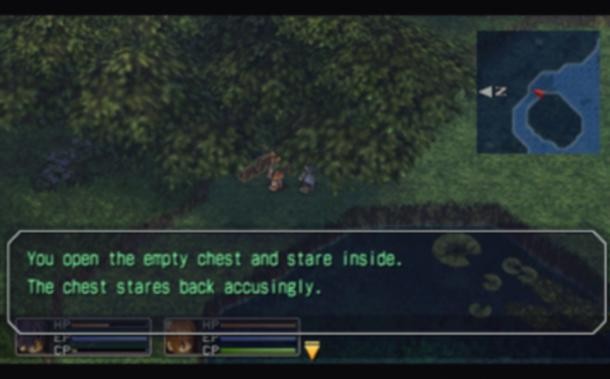
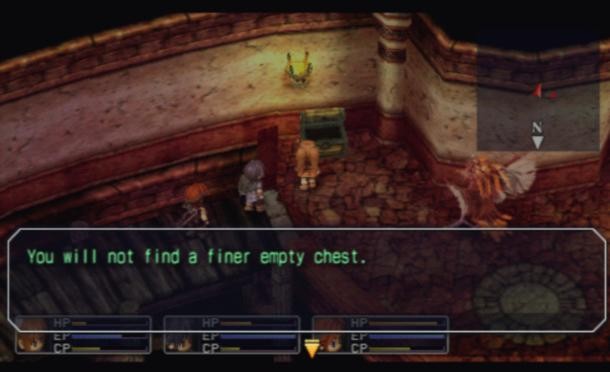
A thank you must be said to Falcom’s dev team for indulging this unusual marketing idea and my bit of fun.
Do you have a specific philosophy that you take in approaching a new translation project? What type of audience do you have in mind while working on it?
Well, knowing your audience is obviously very important before setting to work on a project and for Xseed that means (usually) RPG enthusiasts and fellow Japanophiles. We have all kinds of awesome fans, but what we’re really known for is publishing the niche of niche in JRPGs. That means working a translation to satisfy text purists (those who prefer a translation that strictly adheres to the original Japanese) AND fans of more localized scripts. Not everyone knows or wants Japanese honorifics in their games, while something like "onigiri" can be honestly translated as "rice ball" and doesn’t need to be magically transformed into a "sandwich" just because it’s a slightly exotic food. I try to find a balance between the two and usually don’t get ripped limb by digital limb in the forums for my efforts. Usually.
Anyway, I don’t really have any set motto, but I do like to remind myself at the start of each project to remember the audience, to stay as true to the intent of the original script as I can, and to have fun where fun can be had (textually speaking).
I know that Xseed has not officially announced whether or not it will be bringing the sequel to Trails in the Sky over, but I’ve read that the sequel is even bigger than this game. How long do you expect it will take to translate if that happens? Are you excited at the prospect of doing this or just exhausted?
Trails in the Sky...part 2...
...
I’m told that the brain has a kill switch to help humans black out traumatic thoughts or memories. You just flipped mine.
Thanks, Jessica! Take a well-earned nap and try not to dream of talking treasure chests. Everyone else, check out The Legend of Heroes: Trails in the Sky if you haven't yet. We'll be running a giveaway of some copies of the game on the website later this week, so be sure to check in.

Get the Game Informer Print Edition!
Explore your favorite games in premium print format, delivered to your door.
- 10 issues per year
- Only $4.80 per issue
- Full digital magazine archive access
- Since 1991









